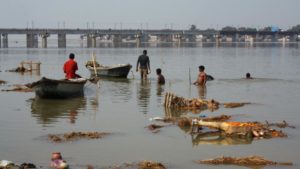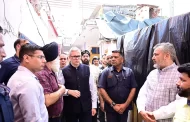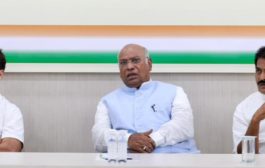
Munilal Kannuajiya has spent most part of his life on the ghats of Ganga washing clothes. At 86, he still gets up at 4am, carries the bundle of dirty clothes of his customers on his head to the Raja Harishchandra ghat and spends nearly eight hours washing, drying and arranging the linen in bundles.
Ask him whether he is concerned about the pollution in Ganga and that he is contributing to the pollution, the old man innocently shakes his head in affirmation. “But where shall we go,” he quickly exhorts. “We are ready to move, but where is the alternative arrangement? The government has only been making hollow promises for the last six-seven years,” says the old man.
Like Munilal, there are at least 500 washer men and women who wash tons of dirty linen in the river every day adding to its pollution.
The Kannaujjiya’s are a miniscule washer men community in Varanasi with approximately 35,000 voter strength, whose lives have revolved around the ghats of the holy river since ages. However, ever since local MP and PM Narendra Modi Clean Ganga action plan has picked up pace, the community leaders claim their survival is under threat.
Rapped by the National Green Tribunal for the ‘lackadaisical approach in dealing with issues concerning pollution in Ganga’, authorities have started wielding their baton driving away the washer men from the ghats, but not all are ready to move.
With polls around, the community leaders have started bargaining with parties to fulfil their demands against their votes. Though traditionally BJP voters, the Kannuajiya’s say, they cannot be taken for granted this time. “Hum log na ghar ke rahe na ghaat ke”(We neither have a house nor the ghat anymore), retorted the community leader, Nandu Kannaujiya, whose organisation, Dhobi Ghaat Bachao Samity has been fighting for appropriate washing centres for relocating from the Ganga ghats.
In the ongoing tussle, it’s the holy river that is suffering the most. Union minister of state for water resources, river development and Ganga rejuvenation Vijay Goel in a written reply in Lok Sabha last month said, “The Centre is aware that the detergents used by washer men along the bank of the river releases phosphate and thereby increases the level of pollution in Ganga.”
He added construction of “dhobi ghats” is included in the schemes under the entry level activities of Namami Gange so that the waste water is diverted away and does not flow into river Ganga.(Ht)










































